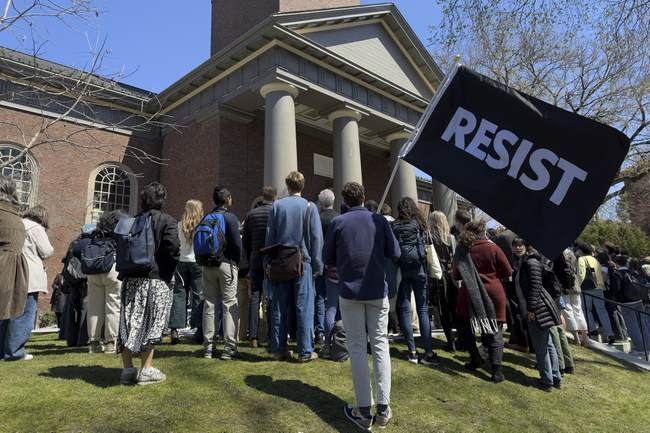
Canada retreated. Will Harvard?
Harvard president Alan Garber keeps saying he wants to find some accommodation with the Department of Education, but refuses to make significant changes. Instead, Garber keeps trying to get courts to force access to federal funds to which Harvard feels entitled, even while other universities see the writing on the wall and have thrown in the towel. Now the Department of Justice has upped the ante yet again, formally declaring that Harvard violated the Civil Rights Act by deliberately allowing anti-Semitic violence and intimidation on its campus:
In a letter sent to Harvard President Alan Garber on Monday and viewed by The Wall Street Journal, attorneys for the administration said the investigation found that Harvard knew Jewish and Israeli students felt threatened on its campus and acted with deliberate indifference.
The DoJ offered Harvard to explore the Hillsdale College option to avoid any further consequences for its failure to abide by Title VI. If not, the DoJ warns, the direction of the next lawsuit will get inverted and Harvard may have more legal trouble than it bargained for:
“Failure to institute adequate changes immediately will result in the loss of all federal financial resources and continue to affect Harvard’s relationship with the federal government,” the letter states. “Harvard may of course continue to operate free of federal privileges, and perhaps such an opportunity will spur a commitment to excellence that will help Harvard thrive once again.”
Harvard didn’t immediately respond to a request for comment.
A formal “notice of violation” of civil-rights law generally is a step that can come before either a lawsuit from the Justice Department or a voluntary resolution with the school. Under past presidential administrations, civil-rights investigations at universities usually ended with voluntary resolution agreements.
This finding not only complicates any efforts to restore funding that has already been cut off, it disqualifies Harvard from any further access to federal funds. They have three options, none of which are going to be pleasant for Garber under the circumstances. They could go the Hillsdale College route and eschew any federal funding to remain completely independent, as the DoJ letter suggests, but Hillsdale built their financial model with that policy in mind. Harvard’s business model entirely depends on federal subsidies and grants. They would have to pare down their offerings significantly to compete in the marketplace against schools that comply with the law and still have access to those federal funds.
That leaves two other options. Harvard could fight the finding in court, but since this is a civil finding, the DoJ has a lower evidentiary threshold. The fact that they have not just kept those who assaulted Jews on campus but rewarded them rather than punish or expel them speaks volumes about this finding. So too does Harvard’s apparent continuation of admissions discrimination even after losing a major Supreme Court case two years ago on that very issue. This finding certainly complicated their current lawsuits aimed at restoring some of the canceled subsidies and grants, and a DoJ lawsuit could deliver a body-blow financial judgment if pursued to its end. That’s why the WSJ notes that most schools in this position cut deals that accepts supervision and changes internal policies so as to avoid backbreaking penalties.
Third option: cave. Garber thus far refuses to concede and negotiate a settlement, arguing that he’s trying to set an example that Academia can’t be pushed around. Unfortunately for Garber, his colleagues in Academia are learning the lessons, both political and legal, that Harvard keeps ignoring. The latest example of this comes from the University of Virginia, which just pushed out its president and his DEI-drenched projects:
University of Virginia President James E. Ryan announced his resignation Friday, a swift response to calls from the Trump administration to step down amid the Justice Department’s probe into the school’s diversity, equity and inclusion practices.
“To make a long story short, I am inclined to fight for what I believe in, and I believe deeply in this University. But I cannot make a unilateral decision to fight the federal government in order to save my own job,” Ryan said in an email sent to UVA community members, which was shared with POLITICO.
The New York Times reported Thursday night that the Trump administration had been communicating privately with university officials to encourage Ryan’s departure, threatening the loss of millions of dollars of federal funding allocated to the university.
The University of Virginia chose wisely. Perhaps Garber will learn a lesson from that, or maybe he’ll choose poorly … again.








